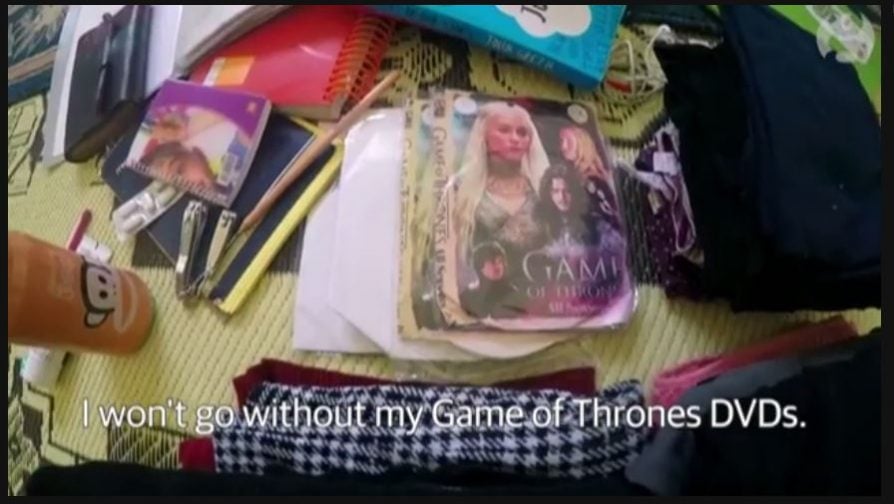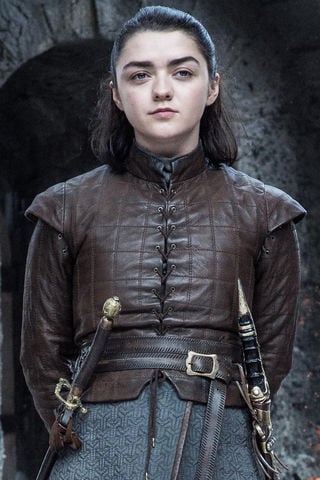Two years after filming her escape from Syria, aspiring refugee journalist visits Malta
Rania Ali and Anders Hammer at Q&A discussion in Malta
© UNHCR/Tümer Gençtürk
At the age of 20, Rania Ali fled her home. Growing up in Raqqa, Rania’s childhood was nothing out of the ordinary; she loved watching television and hanging out with friends, she wanted to study medicine at university. Then when she was about to finish high school, things changed. A massacre committed by ISIS on the Kurds in Kobane triggered a difficult decision; it was time to escape.
“There was never a choice to leave and come to Europe… people lost their houses, they got blown up, they lost their families and had no other way to live.”
Rania Ali
She packed a small rucksack with her essentials: clothes, a toothbrush, her school certificates, and DVDs of her favourite TV show, Game of Thrones.

Rania, a Game of Thrones fan, packs a bag full of her most important and prized possessions. © UNHCR/Tümer Gençtürk
But she also takes something else with her – a Go Pro – given to her by Norwegian documentarian Anders Hammer.
In 2015, Rania and Anders met in Kobane completely by chance and she told him that she wanted to make a first-person film of her escape. In three weeks, Anders taught Rania the basics of filmmaking. Then she was off. Crossing borders by land and sea, all the while recording the hazardous and often terrifying obstacles she faced along the way.
Anders, who kept in contact with Rania throughout, took the footage and made it into a documentary. The result is an intimate and honest insight into the harsh realities of forced migration. The Guardian published Escape from Syria: Rania’s Odyssey in August 2017 and it immediately went viral, with around 1.5 million views in the first 24 hours.
Asked why she documented her journey, Rania explains: “When a lot of refugees started coming to Europe, you could see videos on Facebook, but it’s only the media reporting. No one ever asked the refugees… ‘What do you think? Why did you leave?’
“The media says ‘Millions of people are coming to Europe’… So many Europeans were angry and scared.
“I felt it was unfair. It is the refugee’s journey, and you should be the one who determines how your story is going to be told.” When the story comes directly from the source, “more people can relate to it.”
When she was crossing from Syria to Turkey she feared she’d get punished for carrying a camera. In Macedonia she saw journalists’ cameras being seized by the police, but the consequences for a refugee would be much worse. “I didn’t want the camera to be my death”. In fact there are moments in ‘Escape from Syria’ when the filming stops abruptly, Rania and her companion Ayman making the quick decision to conceal the Go Pro when they are under threat.
Apart from placing viewers in the heart of the action – the film includes close-ups of children crammed on a tiny boat and a frightening encounter with teargas – Rania’s film gives viewers the rarely seen perspective of a refugee woman. She points out that news footage of the ‘refugee crisis’ always depicts men, with women only portrayed as helpless victims. “But women can also do what men do. Women are also fleeing because they were threatened, and because they want a better life. They also want to feel safe again.”
In a packed classroom at the Sudanese community centre in Hamrun, where UNHCR Malta and Kopin held a screening and Q&A session with Rania and Anders, Rania sits confidently, answering the sometimes-challenging questions put to her. When it comes to her life since being granted asylum, Rania is mostly positive: “I’ve only met nice people until now.”
She admits that before she arrived she didn’t know anything about Vienna, her new home. “I just knew it from Billy Joel’s song ‘Vienna’s waiting for you’”.
Slowly, she has started to feel more settled and her German is improving. When it comes to integrating, “Language is the first thing”. Many in the audience nod at this, the refugees and migrants here in Malta familiar with the challenges of not being able to communicate in Maltese and English.
As an aspiring journalist, Rania has now started to give others the opportunity to speak. In her current film project with Swiss NGO Terres des Hommes, she’s providing a platform for young Europeans to voice their opinions, and giving refugees the chance to tell their stories. She’s asking a set of 6 questions to each person she meets about what it means to ‘live together’, side-by-side. It’s important to her that she gets different views, even negative perceptions of migration. Her participants are all younger than 25 years old.
“By hearing true stories from refugees and honest opinions from the locals, perspectives could change.”
https://www.instagram.com/p/Bgo9kBHgVmJ/?taken-by=malirania
For this reason, Rania went around Malta looking for migrants and refugees to interview. This took her to areas with a high population of foreigners – Msida, Hamrun, and Marsa, as well as hangouts like Falafel shops, cafes, Eritrean and Ethiopian restaurants. She also linked up with local NGOs.
Her plans for the future? Apart from visiting other countries to make her ‘Living Together’ film, including France, Albania, Germany and Greece, she only has one aim; to start university. “I’m going to study journalism”, she states proudly.
We had one final, important question for Rania… and that was to reveal her favourite Game of Thrones character.
After surviving a war on her people, making a life-threatening trek across territories, and taking the risk to tell her story… we can definitely see why she’d pick the most headstrong and determined of Winterfell’s house of Stark.
“My favourite is Arya… she’s a badass.”

*This article originally appeared on Lovinmalta.com, 26 March 2018
Share on Facebook Share on Twitter